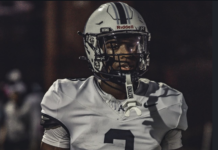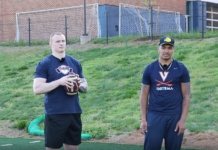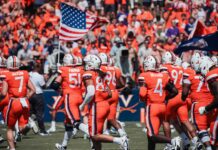Virginia announced earlier today that De’Andre Hunter will miss the NCAA tournament after breaking his wrist. He will have surgery on March 19th, and the subsequent recovery will take 10-12 weeks. Hunter, the ACC 6th Man of the Year, had a breakout season for the Cavaliers, and he emerged during conference play as a key contributor on both offense and defense. Losing him will hurt, no question; Hunter’s contributions on the defensive side of the floor, especially his ability to switch and guard all five positions, provide a level of versatility that cannot be replicated by anyone else on the roster. However, all hope is not lost. Below are five reasons why Virginia still has a chance to go deep in the tournament or even win the whole thing, despite playing without Hunter.
Tony Bennett’s System Doesn’t Focus on One Player: Virginia’s unique system, particularly on defense, is rather well known at this point. The pack-line defense has helped the Cavaliers put together the best defensive season in history. However, another key aspect of Tony Bennett’s Virginia tenure sometimes goes under-appreciated: the Cavaliers don’t rely on any single player to win ball games. Bennett has made a living by taking overlooked recruits, letting them sit for a year or two, teaching them to play defense, and then turning them loose to wreak havoc on the ACC. Further, this year’s team is especially balanced. No player makes up more than 21% of the team’s total scoring, eight players play more than 15 minutes per game, and five different players received postseason honors from the ACC. The pack-line defense is inherently a team-based approach that doesn’t require one standout defender. Virginia’s system, perhaps more than that of any other team in the country, is built to withstand the loss of any single player.

We’ve Been Here Before: It seems like a long time ago, but De’Andre Hunter wasn’t always playing a huge role off the bench for Virginia. The Cavaliers played three games in November and December against Rhode Island, Davidson, and West Virginia. All three teams are in the NCAA tournament field, but Virginia managed to go 2-1 in these games without major contributions from Hunter. He played a combined 28 minutes over the three games, scoring just three points. That’s not to say that the Cavaliers won’t miss Hunter; rather, there is a precedent for beating good, tournament-quality teams without him. Other players needed to step up: Isaiah Wilkins had 19 points against Rhode Island, and Nigel Johnson put up 22 against the Wildcats. Virginia will need more of these types of performances in the tournament (more on that later), but there’s no reason to believe that the Cavaliers cannot win without Hunter, even against quality opponents.
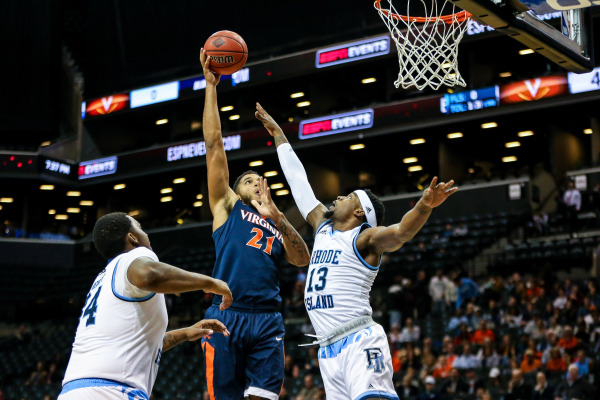
Favorable Match-Ups: It’s impossible to know who Virginia will face in the tournament after University of Maryland, Baltimore County. However, FiveThirtyEight believes there is a 58% chance the Cavaliers will face Creighton rather than Kansas State in the Round of 32. In the Sweet 16, FiveThirtyEight gives Arizona a 48% chance and the University of Kentucky a 40% chance to face Virginia. So let’s focus on those four teams.
The bad news: both Kansas State and Arizona run their offense through their star big men, and the pack-line defense has historically been susceptible to skilled bigs that can shoot. However, there’s also good news: Hunter’s injury has very little impact on Virginia’s ability to guard big men. The pack-line defense rarely traps with perimeter players, so it will still be largely up to Wilkins, Jack Salt, and Mamadi Diakite to attempt to hold Kansas State and Arizona’s talented frontlines in check.
Creighton and Kentucky do things slightly differently. Creighton predominantly plays through their two star guards, Khryi Thomas and Marcus Foster. Both are excellent players, but the rest of the lineup lacks depth. The Bluejays were also 0-4 against Providence and Marquette, and had losses to Butler (No. 10 seed) and Baylor (missed tournament). Creighton is good, but I expect the Cavaliers to be able to handle business and advance to the Sweet 16. If they do make it that far, a matchup with Kentucky is probably the most difficult outcome. The Wildcats are extremely athletic, and have a number of perimeter scoring threats: Kentucky’s top four leading scorers play outside the paint, and they combine for 65% of the team’s total scoring. Kentucky’s best player is probably Kevin Knox, a 6’9″ combo forward who’s scoring almost 16 points per game while shooting 35% from 3pt. This is where Hunter will be missed the most – he’s long enough (7’3″ wingspan) and strong enough (222 lbs) to guard Knox, who’s probably a step too quick for Wilkins to handle. Coach Bennett will probably assign Diakite or Devon Hall to defend Knox, both capable defenders, and count on the pack-line system to slow down and perhaps frustrate a young Wildcats team. Bottom line: it’s tougher to win without Hunter, but Virginia has the roster and system to beat any of the teams they’ll face prior to the Elite Eight.
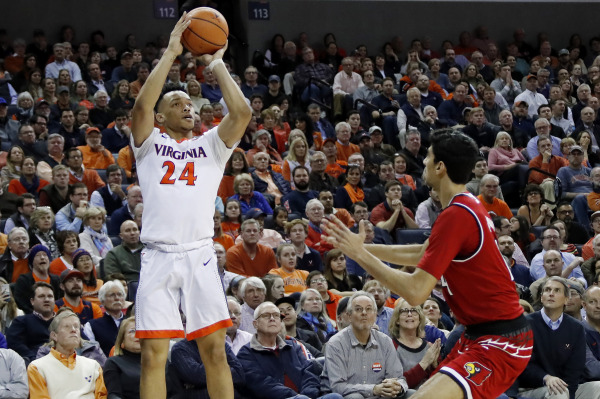
Marco Anthony Has Delivered When Called Upon: Marco Anthony only averages about eight minutes of playing time per game, but he’s performed very well when he’s been on the court. He’s played more than 14 minutes in four games; in those games, he’s averaging 5 points, 1.75 assists, 1.5 rebounds, and 0.5 steals per game. More importantly, he’s averaging less than one turnover per game, while shooting almost 38% from 3pt. His best game came against Louisville, when he filled in for a suspended Nigel Johnson and provided 10 points on 4-of-6 shooting, including 2-of-3 from 3pt, while playing 18 minutes. Anthony’s physical frame (6’4″, 228 lbs) compares favorably to Hunter and Hall and allows him to defend bigger opponents (think Kentucky’s Knox), plus the advanced metrics (91.7 defensive rating according to Basketball Reference) prove Anthony is defending well enough to stay on the floor. He’s just a freshman, and he’s only played 13 games – it’d be foolish to think he can simply step in and replace Hunter. However, Anthony has demonstrated he’s more than capable of playing well when given the chance.
Jay Huff! De’Andre Hunter’s performance against Duke was what seemed to catch the eye of the nation and cement his status as an impact player for the Cavaliers. The Blue Devils switched to a 2-3 zone defense in the second half, which flummoxed Virginia until Hunter was inserted into the lineup, set up shop in the middle of the zone, and picked Duke apart. Duke was unable to stop his devastating combination of size and playmaking ability, and Syracuse later had similar problems. As such, now that Hunter is out, there’s been discussion that the Cavaliers may now be in serious trouble should they face a zone defense (Cincinnati, the No. 2 seed who FiveThirtyEight gives 53% chance of making the Elite Eight against Virginia, loves to deploy a 2-3 zone) somewhere in the tournament.
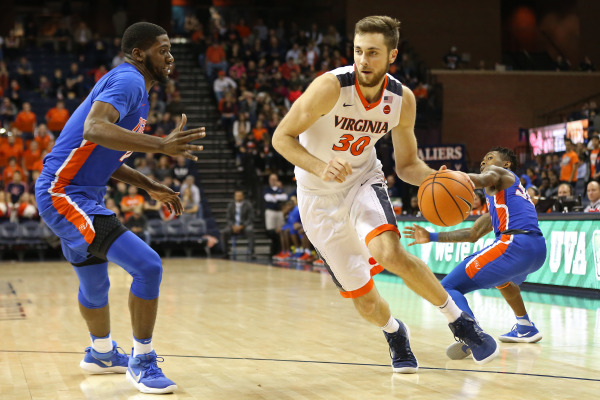
However, Hunter’s injury may finally allow Coach Bennett to unleash Jay Huff, the high-flying, sweet-shooting, 7’1″ big man that has spent much of the season in a reserve role. Huff, who averages just 8.8 minutes per game, came into the year with relatively high expectations: he came to the Cavaliers as the 73rd ranked recruit in the country, then spent his redshirt year bulking up and learning the Virginia system. Things haven’t quite gone as planned for Huff, but when he’s been extremely efficient when he’s played. In games in which he’s played more than 10 minutes, Huff is averaging 7 points (on 75% shooting!) and 3.8 rebounds. Part of that is surely due to inferior competition, but Huff offers a potential option for Virginia should they encounter an opponent who plays a lot of zone defense or just has a small frontline.
Bottom Line: News of De’Andre Hunter’s injury crushed the Virginia fanbase, and rightly so: losing the ACC 6th Man of the Year is obviously a difficult obstacle to overcome, particularly when that player provides such unique things to a team. However, there’s no reason to suddenly change your brackets or write off the Cavaliers in the tournament. FiveThirtyEight adjusted Virginia’s chances of winning the national championship from 18% to 14%, which is still the second-best odds for any team. The Basketball Power Index is even higher on the Cavaliers, giving them a tournament-best 22.6% chance to win it all. More importantly, it’d be silly to count-out a team that has thrived in an underdog role. Remember: this team was picked to finish 6th in ACC preseason polls, started the year unranked, and has key contributors that were overlooked 3-star recruits. Coach Bennett has created a culture at Virginia that’s bigger than a single player and defies expectations time and time again. They can do it one more time this year, by stringing together six wins against tough competition and cutting down the nets in San Antonio.







